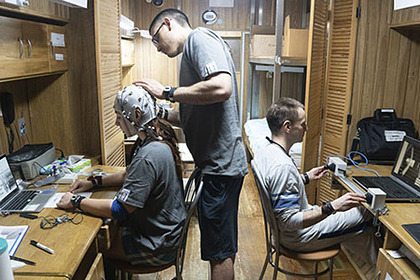Russian scientists have shown how the interplanetary crew will communicate with the Earth 
at the time, they experience psychological alienation from the flight control center. An article describing the results of the first two stages of the SIRIUS (Scientific International Research in Unique Terrestrial Station) program was published in the journal Frontiers in Physiology.
As part of the predecessor of the program, the Mars-500 project, scientists have identified the psychological isolation of the crew from the flight control center. The SIRIUS project carried out at the Institute of Biomedical Problems (IBMP) of the Russian Academy of Sciences provides for scientific model experiments lasting 17, 120, 240 and 360 days.
The first two stages – 17 days and four months in duration – were carried out in 2017 -m and 2019, respectively. As part of the second phase, the researchers recorded 320 conversations with six volunteers – three women and three men – over the first ten days, lasting 11 hours.
Starting on the 11th day, scientists added an artificial communication delay, which is similar to that experienced by astronauts on the Moon and Mars. In four months, the number of video messages to the flight control center fell from 200 in the first week to 115-120. The duration of these messages has also become shorter. The nature of communication has also changed: women began to show more joy and sadness, while men – anger. At the same time, the researchers note, the differences in the style and content of communications with the Earth gradually smoothed out, and the crews themselves became more integral, despite the different origins of the participants.
“In autonomous conditions, psychological autonomy of the crew takes place, which becomes less dependent on the flight control center, “- said one of the researchers, senior researcher at the Institute of International Biological Problems of the Russian Academy of Sciences Dmitry Shved. On November 4, the third stage of the project began, which will last 240 days. During it, it is planned to reproduce the main stages of the long-term mission. The annual experiment is scheduled to begin in the first quarter of 2023.